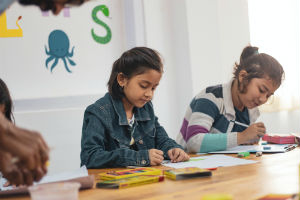#WeAreTogether: A fifth of UK pupils missing out on English language development as home-schooling continues
29 April 2020

Children whose home languages are not English need more help with home-schooling as classrooms remain shut, say education experts.
Researchers at the University of Reading's Institute of Education have put forward a range of measures to support the parents and teachers of bilingual or multilingual children during school closures.
Around a fifth of pupils in UK schools have English as an additional language (EAL) and may be more vulnerable to missing out on education as mass home-schooling continues.
Teachers who are used to working in multilingual classrooms and adapting their lessons for EAL children, may now struggle to create online lesson plans that work for all children, no matter what stage they are at in their learning of English as a language.
Equally, some parents feel confused about which language to home-school in.
Dr Naomi Flynn, Associate Professor of Primary English Education at the University of Reading's Institute of Education, has offered advice and support to both parents and teachers.
Dr Flynn participated in a free webinar for schoolteachers last week. As part of an expert panel, she offered practical suggestions on supporting EAL pupils during and after school closures, and answered questions posed by the audience. The webinar was hosted by The Bell Foundation and the National Association for Language Development in the Curriculum (NALDIC), a charity for which Dr Flynn serves on the executive committee.
"Teachers are working very hard to provide online resources for their school children so that they can continue their education at home. However, many feel ill-equipped to properly support EAL children in these circumstances," said Dr Flynn.
"Spaces for the webinar filled up very quickly - demonstrating the need for extra support for teachers. My advice for teachers is to consider what stage of English their EAL pupils are at and what vocabulary is required for each lesson. They can then start to think about how the lessons can be more accessible for EAL children, whether that is through audio description of tasks, or using pictures or video content as part of the lesson requirement."
Dr Flynn and University of Reading linguistics expert, Professor Ludovica Serratrice, have also posted videos for parents on the Bilingualism Matters@Reading site. In them they encourage parents to continue to speak to their children in their home language, if that is their family norm. In videos which can be watched in English, Spanish or Italian they explain:
"It is natural for parents of bilingual or multilingual children to be worried about the impact of school closures on their child's learning of English.
"For many families, school is where their children speak English, and home is where they speak their first language. If that is the case, my advice for parents is to continue doing this. These are unprecedented times so now is not the time to start speaking a different language at home. Research shows that a strong foundation in your first language helps when learning a second or third language so this will not be a hindrance when they go back to school."
Bilingualism Matters@Reading, hosted by The Centre for Literacy and Multilingualism at the University of Reading, provides training, advice and information on child bilingualism to anyone interested or involved with raising, educating and caring for bilingual and multilingual children.
Languages under lockdown
Last week, researchers led by Professor Serratrice, Director of The Centre for Literacy and Multilingualism, together with Bilingualism Matters@Reading and colleagues at the University of Cambridge, University of Oxford, UCL, NALDIC, Mother Tongues Ireland and We Live Languages, launched a survey to find out how the current lockdown is affecting language use in multilingual families.
Multilingual families who agree to take part will be asked to complete three short surveys; one now, one when the next school year starts, and one a year from now. Those happy to be interviewed will be asked how their beliefs about multilingualism and their use of English and of their other language(s) may have changed over the year.
The findings of the survey will be used to share language practices and ideas that may be useful to multilingual families for both English and their other language(s).
The first round of the survey is open until 15th June 2020. Participants will be entered into a prize draw where two £40 vouchers are on offer.
More details, and a link to the survey, can be found here:
https://www.surveymonkey.co.uk/r/MultilingualFamiliesPandemic
